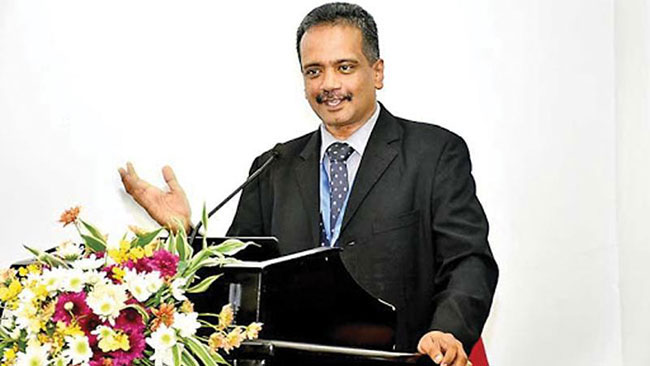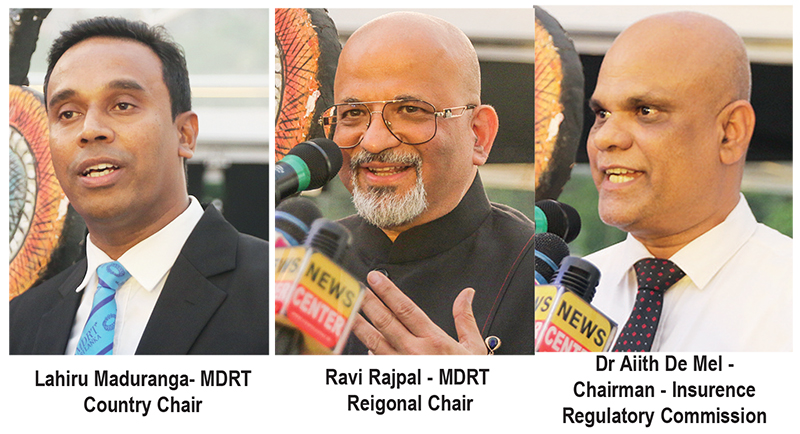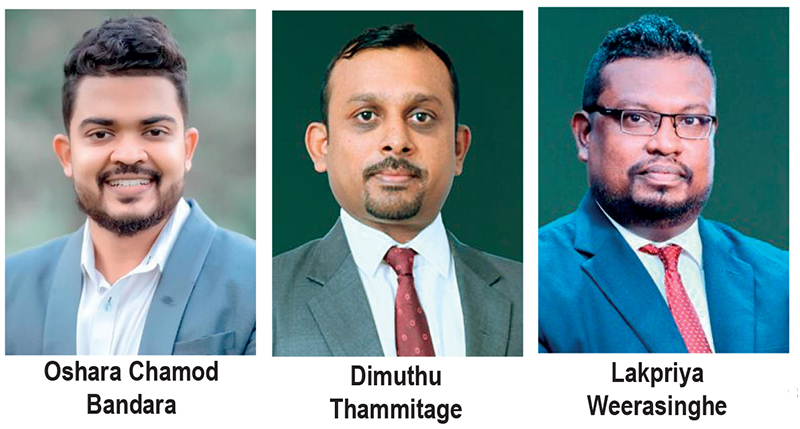Business
‘Primacy given in SL to primary production rendering the achievement of food security difficult’

By Ifham Nizam
Sustainable food security is not an easy target to achieve in a country like Sri Lanka, where primary production has been given the priority, Professor Buddhi Marambe of the Department of Crop Science, Faculty of Agriculture, University of Peradeniya said.
Speaking to The Island Financial Review Marambe stressed that concerted efforts are required to achieve this target. Food security cannot be achieved entirely from national agricultural production.
Marambe added: ‘A country cannot be self-sufficient in all types of food to fulfill the needs of the people encircling all components of food security. Thus, food imports also play an important role in filling the demand and supply gap.
‘At this moment, Sri Lanka’s need is a national policy covering all aspects of agriculture, not only to overcome the current food and economic crisis that it experiences, but also to ensure that the whole nation will not fall a prey again to such man-made or natural disasters.
“What we require is a futuristic national policy that is evidence-based, to enhance confidence in all food-system actors and remove the uncertainties created in their minds due to faulty assurances given in the past by politicians and state agencies and help build dignity in a person as a player who contributes to national development. We need not think of doing wonders, but simply move away from extremist ideas, and face the reality, be pragmatic.
“Sri Lanka is famous in making national policies and action plans. However, their implementation is always a question due to lack of proper institutional coordination, monitoring, evaluation and reporting systems. People, including politicians, have rarely been made responsible and accountable for what they say, what decisions they make and impose.
“Hence, a future policy, especially in agriculture, should seriously consider the governance aspects in implementation. There should be a shared vision, responsibility and accountability of all individuals and institutions or entities on who is doing what, what is being done, and what is planned to be done, according to the national policy to support the progress of Sri Lanka’s economy.
“Sri Lanka went through a process to develop an Overarching Agriculture Policy (OAP), and the document was almost finalized in 2020. Food crops, perennial crops, plantation crops, livestock and poultry, fisheries, irrigation, agrarian development, and environment were the areas covered by the OAP, developed through a comprehensive stakeholder consultation process, considering the views from all actors in a food system.
“The consultations for the OAP started at the nine provinces, obtaining views from the ground-level staff, farming community, and then the national level stakeholders and the Department of National Planning (DNP) of the Ministry of Finance provided the required leadership.
“To the best of my knowledge, this is the first time that the DNP was fully involved from the initial stages of developing such a policy due to its cross-cutting nature. This is a timely and appropriate effort given the diverse nature of the broad subsectors covered in agriculture.
“A clear balance and inter-connectivity of subsectors are to be maintained for overall sustainability. The European Commission (EU) provided the required assistance. The OAP seems not moving forward, but it is the high time to bring it to the limelight to provide required guidance to develop the agricultural economy of Sri Lanka.
“We should improve agricultural productivity and production with a view to maximizing the contribution of agriculture to the country’s food security. The productivity achievement should accompany realistic goals. The cry from different sectors of society is for varieties and technologies when a crisis is imminent. We cannot come up with new varieties or breeds overnight. Even for a human child to be born there should be 9-10 months of gestation. A new crop variety in rice would take 6-8 years to be recommended and be released.
“A new cultivar of a crop like tea took about 25 years though now with technological advances, our scientists are able to shorten this gestation period to 18 years. Let us understand this reality. Genetic barriers are not easy to tackle. We need patience, but, proactive forward thinking would make the dream of sustainable food security a reality. Further, we do have a good crop cultivation plan, but should also focus on a post-harvest management plan done simultaneously before crying foul about post-harvest losses, especially during a glut of agricultural produce in the market. These are not based on rocket science or advanced philosophical thinking, but aspects that have been brought to the notice of policy makers on several occasions. Unfortunately, such propositions were not considered favourably.
“As a nation, we need to take our famers out of the cell by continually identifying them as ‘poor farmers’. We should make society understand that the ‘poor doing farming’ and the ‘farmer becoming poor’ are two different aspects. It is the latter that we need to address promptly. Indeed, poverty issues in the country should be addressed. However, agriculture is not the panacea to resolve all the problems of the poor, or the country as a whole. Entrepreneurial farming is the key to the future and needs to be promoted through careful articulation.
“The following seven aspects are priorities in a national policy leading to agriculture development and food security in the foreseeable future, considering crops (food and feed, perennial and plantation crops), animals (livestock, poultry and fisheries) and allied sectors:
“(1) Productivity enhancement of agriculture ecosystems through adoption of Good Agricultural Practices (GAP) and Good Animal Husbandry Practices (GAHP) to be demand-driven, while tackling food nutrition and safety and environment-related issues in production and product-processing.
(2) Development and adoption of climate-resilient crop varieties and animal breeds be supported while ensuring timely availability of inputs (e.g. seeds and planting material, fertilizer, pesticides, irrigation water, machinery for crops, feed and drinking water for animals).
(3) Efficient production technologies (e.g. protected agriculture, micro-irrigation, crop-animal integration, etc.) and value addition (e.g. GAP-certified products, and mechanized production and product-processing systems) be promoted with a special focus on youth and gender considerations.
(4) Efficiency of actors in the urban-rural connectivity in the food system be enhanced to reduce “food miles” (distance of food transport from producer to consumer), losses and prices through improved packaging and storage, and an efficient transportation system.
(5) A market-driven agriculture economy be supported through public-private-producer partnerships (PPPP) with targeted-subsidies, continued well-focused capacity building programmes and centrally-governed extension services.
(6) Dignity of the farming community and all other players in the food system be assured through mechanisms such as pension schemes, credit facilities with less hassle, supporting establishment of farmer companies, etc., where relevant.
(7) All actors in a food system, especially the politicians, officials of the state, private and non-governmental sector including academia and researchers/scientists, be made accountable and responsible for the decisions made and advocacies given in relation to agriculture.”
Business
Global Insurance leaders to converge in Colombo for MDRT Sri Lanka Day 2026

In a first for Sri Lanka’s insurance industry, the country will host MDRT Sri Lanka Day 2026, also known as International Insurance Day, bringing together global leaders, professionals and organisations from the international financial services and insurance sectors.
The initiative, organised by the Million Dollar Round Table (MDRT), will mark Sri Lanka’s inaugural MDRT Day and is scheduled to be held on 18 May 2026.
MDRT Country Chair – Sri Lanka, Lahiru Maduranga, said the event would provide a significant opportunity to position Sri Lanka on the global insurance and financial services map.
“This is an excellent opportunity for Sri Lanka to host such a prestigious event and to promote the country’s standing globally,” Maduranga said.
He made these remarks at the official sundown launch announcing the event, held on 26 January at 8 Degrees on the Lake, Cinnamon Lakeside, Colombo.
The launch was attended by the Chairman and Director General of the Insurance Regulatory Commission of Sri Lanka, chief executive officers of insurance companies, and regional and zonal chairs of MDRT, at which the official date of MDRT Sri Lanka Day 2026 was unveiled.
Maduranga said the landmark event aims to bring the spirit and experience of the MDRT Annual Meeting to the Sri Lankan MDRT community. The programme will feature the MDRT President, Executive Committee members and internationally renowned speakers, offering world-class insights, inspiration and professional development aligned with MDRT values.
He noted that many Sri Lankan MDRT members face challenges in attending the Annual Meeting overseas due to foreign exchange constraints and visa limitations. Of more than 1,200 MDRT achievers in Sri Lanka, only around 50 were able to attend the Annual Meeting in the United States.
“This initiative marks a significant step forward in strengthening the MDRT culture in Sri Lanka and in elevating professional standards within the local insurance services sector,” Maduranga said.
The MDRT Membership Communication Committee (MCC) serves as the official liaison between MDRT Headquarters in the United States and the Sri Lankan MDRT community, overseeing communication, engagement and coordination with the local financial services sector.
Founded in 1927 in the United States, the Million Dollar Round Table (MDRT) is the world’s most prestigious association of insurance and financial services professionals. MDRT represents the highest standards of professional excellence, ethics and performance in the industry. Its Annual Meeting, traditionally held in the United States, attracts more than 10,000 top-performing members from around the world each year.
By Hiran H Senewiratne
Business
ESOFT UNI Kandy leads the charge in promoting rugby among private universities

With the aim of fostering a passion for rugby among students in private universities and higher education institutes across Sri Lanka, ESOFT UNI Kandy has launched a special sports development initiative.
As a part of this program, a series of rugby encounters were recently organized between the ESOFT UNI Kandy rugby team and the SLIIT Kandy Uni rugby team. The matches were held at the Peradeniya University Rugby Grounds.
Two highly competitive matches were played during the event. In the first game, the ESOFT UNI Kandy rugby team secured a victory over SLIIT Kandy Uni with a score of 17-07. They maintained their winning streak in the second match as well, defeating their opponents with a final score of 12-07.
This initiative is seen as a significant step toward building a robust sporting culture within the private higher education sector in the hill capital.
The initiation has been started with Rugby and will soon be extended to Cricket, Football, Martial Arts, Badminton, Hockey, Chess, and other areas of sports as well. ESU believes that the development of soft skills, parallel to higher education, will help shape highly capable, industry-ready, and employable students who can confidently face any personal and professional challenges they encounter during their journey.
Dimuthu Thammitage, General Manager, ESU Central Region said: Today’s job market demands highly employable individuals who possess not only educational qualifications but also strong soft skills, which can be effectively developed through sports. Therefore, we warmly invite other educational institutions to join hands with us in producing highly employable students together through sports.
Lakpriya Weerasinghe, Deputy General Manager, ESU Kandy said: At ESOFT Uni, we believe that sports play a vital role in improving students’ personalities through the development of essential soft skills. Therefore, we encourage our students to actively join our clubs and enhance their soft skills alongside their academic education.
Oshara Chamod Bandara, MIC Rugby Club, ESU Kandy said: Sports are iconic to Kandy. As the MIC of the ESU Kandy Rugby Team, I am truly happy to see the enthusiasm of our students towards sports while actively engaging in their studies. I warmly invite other students to join our clubs and further develop their skills alongside their academic journey.
Text and Pix By S.K. Samaranayake
Business
Altair issues over 100+ title deeds post ownership change

Altair Residences have, over the past six months, seen more than 100 individual title deeds being executed by apartment owners, providing owners with a clear, registered, legal title to their apartments in accordance with Sri Lankan property law. This has been a key initiative by the new owners and management of Altair to improve governance and will continue in an orderly manner in the coming months.
With the transition of ownership to Blackstone India, Altair’s Management Council has also been formally constituted, enabling owners to play an active and proactive role in the management of the Altair building. In addition, the management council has appointed Realty Management Services (RMS), a subsidiary of Overseas Realty Ceylon PLC, as the new facility manager of Altair.
Commenting on these milestones, Thilan Wijesinghe, Chairman of TWC Holdings, who, together with a team from TWC, represents Blackstone’s interests in Sri Lanka, said, “The issuance of individual title deeds is a critical step in any professionally developed residential asset. Over the past six months, this process at Altair has moved forward in a structured and transparent manner, alongside the formal establishment of owner-led governance. This, combined with the appointment of experienced facility managers are fundamental building block for long-term value-creation for apartment owners and proper asset stewardship.”
With ongoing improvements to the building being undertaken by Indocean Developers Pvt Ltd (IDPL), the owning company of Altair, the issuance of deeds to owners is expected to accelerate over the coming months.
-

 Business7 days ago
Business7 days agoComBank, UnionPay launch SplendorPlus Card for travelers to China
-

 Business4 days ago
Business4 days agoClimate risks, poverty, and recovery financing in focus at CEPA policy panel
-

 Opinion3 days ago
Opinion3 days agoSri Lanka, the Stars,and statesmen
-

 Business2 days ago
Business2 days agoHayleys Mobility ushering in a new era of premium sustainable mobility
-

 Opinion7 days ago
Opinion7 days agoLuck knocks at your door every day
-

 Business2 days ago
Business2 days agoAdvice Lab unveils new 13,000+ sqft office, marking major expansion in financial services BPO to Australia
-

 Business2 days ago
Business2 days agoArpico NextGen Mattress gains recognition for innovation
-

 Editorial2 days ago
Editorial2 days agoGovt. provoking TUs













